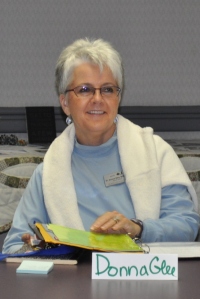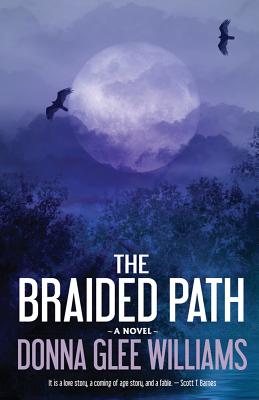The Local Scene: Donna Glee Williams
← The Hardest Part: Robert Creekmore on AfiriThe Exploding Spaceship International Women's Day Special Edition →
The Local Scene: Donna Glee Williams
Posted on 2015-03-05 at 19:56 by montsamu
[Editor’s Note: New column The Local Scene will introduce some of North Carolina’s fantastic roster of authors and their books, monthly on first Thursdays.]
North Carolina author Donna Glee Williams was born in Mexico, the “daughter of a Kentucky farm-girl and a Texas Aggie large-animal veterinarian.” Having grown up “mostly” in Maryland, she lives in “the hills” of North Carolina, adding that “the place I lived the longest and still call home is New Orleans.” By day she leads seminars on a variety of topics, with past jobs as a member of a schooner crew, a librarian, an environmental activist, a registered nurse, a teacher, and “a long stint as a professional student.”
She is incredibly widely published in fiction, poetry, and non-fiction, in print publications ranging from Bluegrass Unlimited to Inside Kung-Fu and still more online publications and journals, which you can sample from her links page. Her first speculative fiction short story “Limits” was published in Strange Horizons in 2007, and received an Honorable Mention in Gardner Dozois’s The Year’s Best Science Fiction for that year; in late 2011 it became the first of two of her stories to be published in audio by PodCastle, followed in August 2012 by “The Circle Harp”. (A short flash horror piece, “Dancing”, followed two weeks later in Pseudopod.)
In March 2014, Canadian publisher EDGE Science Fiction and Fantasy published her first novel, The Braided Path, also available in Kindle and Kobo ebook formats. The Braided Path grew out of “Limits” and continues the same characters and worlds as the short story, which according to Williams “owed a lot to the feather-editing of Jed Hartman at Strange Horizons”. It presents an allegorical secondary-world fantasy that to me can be described as standing somewhere in the midpoint of an imaginary line between Catherine M. Wilson’s When Women Were Warriors and Sofia Samatar’s A Stranger in Olondria, perhaps with a dash of Kim Stanley Robinson’s Shaman or even more of Chris Beckett’s Dark Eden as well. Williams’ world is clearly not our own, centered on a pre-modern society of connected villages of rope-makers and other crafters, of storytelling and dreaming, set on a single path leading up- and down-slope. According to Williams, “The craft society of The Braided Path owes a lot to the time I’ve spent hanging out in villages in Spain, Italy, Israel, Turkey, India, and Pakistan,” adding in her acknowledgements in the book that “this tale was born on a long, sweaty, uphill walk one July” in the hills of North Georgia.
The Braided Path is also centered on a young widow, Len Rope-Maker, and two youths, Cam (her son) and Fox (his sweetheart), struggling to find their place and (if any) limitations, one drawn upslope and the other downslope to the sea. While a fantasy novel, their journeys are not beset on all sides by mythological or magical foes. As Williams describes it: “There are no vampires, zombies, werewolves, princes, swords, dragons, wizards, or any magic at all, really.” Instead, Cam and Fox must face the more ambiguous pulls of up and down, away from each other, while there is no denying the connection that also binds — or braids — them together. It’s a poignant story, and lyrically written, sentimental at times but not overly so. We were all young once, wondering about our own futures, in worlds of endless possibilities and directions. Even given a shared avocation of “Far-Walker”, there is still the choice of up or down, of leaving behind or staying in place, of binding or simply connecting, tethered in heart rather than to one physical place.
Williams’ next novel, Dreamers, is, like The Braided Path, “set in a world that isn’t this one, a desert land where policy is guided by the dreams of one isolated girl who is revered like a priestess but treated like a prisoner. The story follows her journey towards finding her full and independent true Self.”


